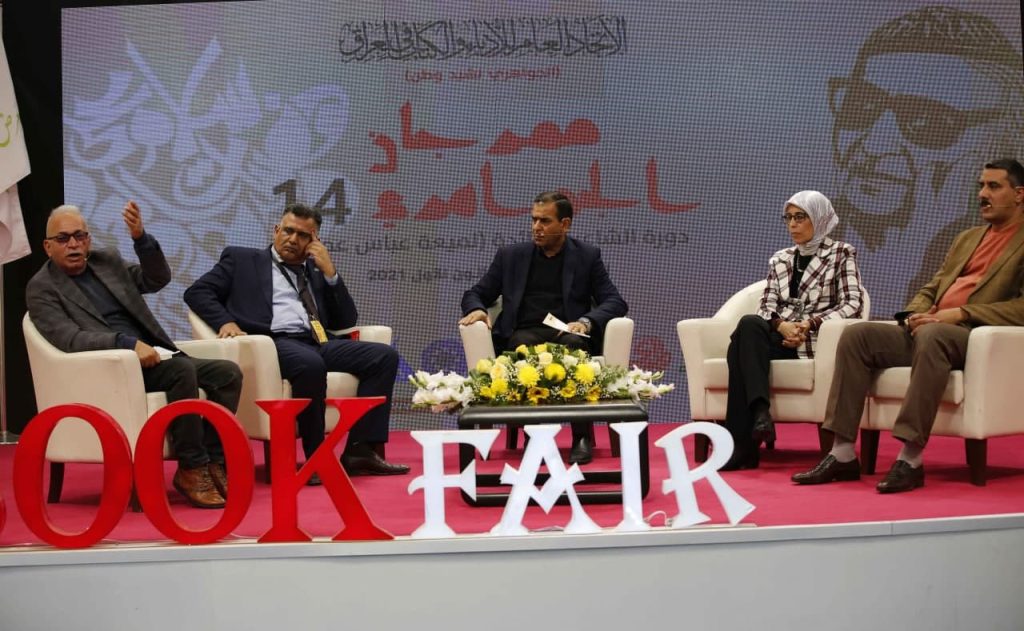
حارث رسمي الهيتي
تصوير: وسام العقيلي
Dr. Nadia Hanawi, who presented her paper tagged (Social Literary Text in Cultural Studies, Jalal Khaled’s Novel as an Example), spoke saying, “Dr. Abdullah Al-Ghadami’s book Cultural Criticism Reading in the Arab Culture Patterns had a great impact on the spread of the name of cultural criticism at the expense of the name of cultural studies, the motives behind this commonality differed, between fascination with this openness in cultural studies and evasion of the standards of criticism and the privacy of its methods and terminology, under the pretext that literary criticism has become powerless and does not perform its tasks. He has reached a dead end and there is no aesthetic need for his presence.”
Hanawi added, “Literary criticism can reduce this phenomenon if it has an institution that controls critical work and allows its practice by those who are at least provided with the ABCs of criticism that qualify them to acquire knowledge and understanding in its theories and schools, but the absence of this institution does not mean that literary criticism is without protection or control, as the ingenuity in it and the increase in it remain creativity and growth.”
Women as a cultural concept is the title of the paper presented by Dr. Tariq Ziad Mohamed who spoke about “The subject of the other is the woman is one of the axes of the work of Arab critics, proceeding from the idea of the marginalized other, especially among ancient poets, considering that women represent an implicit symbolic cultural pattern that discovers through a close cultural reading that the presence of this women’s pattern is important in building the image, as it moves in a convincing plot, and therefore it is a hidden and implicit pattern capable of disappearing using aesthetic and linguistic masks.”
Dr. Tariq pointed out that “the woman when the poets tramps are only a symbol, her presence when the poet Tramp expression of the vision of tramps and their perception of life and society, which is a cultural pun of the product of the pressure systemic that imposes its conditions on the data of culture, creates the personality of the cultural opponent who convinces multiple masks to impose the conditions of the virility pattern and copies any other discourse against the virility of culture and the personality of the mighty stallion. “
Dr. Sami Shehab Ahmed presented a paper entitled (Cultural and Textual in Contemporary Iraqi Criticism, Fadel Thamer and Hatem Al-Saker as a Model), indicating that “critical discourse seeks with its icon to monitor the concepts, transformations and intellectual structures rooted in creative literary texts that constitute its identity of changes through a series of tensions, accountability, the trial of the implicit, the detection of the hidden and so on.”
“Critics do not follow the same pace in interacting with emergency developments, issues and topics, but they are similar on specific fronts and differ on many fronts, and this is a good omen because the critical intellectual system is fragmented and as a result of divergence and difference, a new thought arises,” he added.
(Textual criticism and contextual criticism: a reading in the phenomena of Iraqi criticism) is the paper presented by Ali Saadoun, in which he talked about “This contrived conflict between two critical approaches would not have surfaced if it were not for the obsessive tendency and cognitive hegemony that monopolizes the fact of delivery in one way to think about literary theory and circulate it according to what we are accustomed to in the methods and methods of scientific and literary research, which led literary criticism theorists to a kind of resistance that is based on classical standards in maintaining The last castles and fortresses of the academy and its old closure.”
As for Dr. Ammar Ibrahim Al-Yasiri, he presented a paper (Undermining the major narratives in the contemporary poetic text Karbala as a model), in which he said, “Since the first philosophical question, philosophical thought has worked to develop sociocultural complexities that regulate human thinking, and the philosophical complexities have varied between ideals, rationality, practicalism, etc., that this productive philosophical discourse sought to create a unique model in its loft.”
